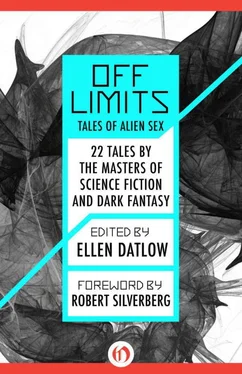The applause is thunderous as Claudio flies from view, while I wait without curiosity to see which of his guests Spengler has selected for participation in the second act of my performance. I feel no surprise as all twelve men begin to undress and crawl up onto the cool, white marble like hungry dogs, ravenous for a taste of game.
Backstage later on, as Heinrich bathes my bruised and battered body, I reflect on the bitterness I feel; it’s not the taste of semen or any sense of degradation—I became inured to such things long ago on the docks at Maua—it’s the realization of what I did to get here.
Spengler enters the room. “You pleased them, Estela,” he says. “You may go now.”
“Rudy called me,” I tell him.
“You are looking forward to seeing him again?”
“He says Cledilce Macedo is coming to Berlin.”
“So I hear. It’s nothing for you to worry about.”
“I don’t feel well,” I tell him. “I’m not sleeping.”
He frowns. “Kleinfeld said you were in prime condition. It’s the dust perhaps? You mentioned bad dreams.”
“It helps me to remember,” I say, wondering at his immunity to the poison in my words.
“There are things we can give you to help you forget.”
“I want to remember.”
Spengler sighs, a pained expression on his face. “You mustn’t make things difficult,” he says. “For either of us.” Then he leaves and I tell Heinrich to fetch the car and drive me home.
Rudy is waiting, lounging on the bed, drinking my cognac. He smiles behind his wire-rim spectacles, then gets up and kisses me lightly on the cheek. I hate it when he does that, like a dog pissing against a tree, marking its territory. “It’s late, Rudy, what do you want?”
In his white chinos and loose, Hawaiian shirt, he looks like a lost tourist, lacking only a camcorder. He runs a hand through his thick, brown hair and says, “You have been wondering about Cledilce?”
I ignore the question and pour myself a cognac.
He follows me to the drinks cabinet. “In two days she starts performing for the Birds of Paradise ,” he says.
“So soon?” I ask. “What about refinements?”
Rudy sips his drink. “They don’t place the same emphasis on refinements anymore. She had one week with a Chinese courtesan. You’re unique, Estela, a jeweled Bird. But these days, there isn’t the same demand for cultured conversation; nobody wants to discuss Günter Grass or the poetry of Ernest Newboy, they just want to fuck you. This bothers you?”
It does, but I don’t admit it, not to Rudy. “Spengler sent you?”
Rudy removes his glasses, holds them in front of him as if to magnify my features. “We talked. He’s concerned about you, as an investment of course. I spoke with Kleinfeld; he mentioned you’re worried about the disease.”
“Shouldn’t I be?”
Rudy shrugs his shoulders. “No, nor about Cledilce. I never wanted to leave her behind. That was you.” Rudy walks to the door, hesitates, and says, “There wasn’t time, or have you forgotten what you did? By the time that mess was cleared up, our contract with her had lapsed.” And then he is gone.
His parting words leave a fear stain on my mind. Faithful Heinrich brings the pipe. He heats the bowl and I hit on the dust, holding it down deep in my lungs, letting it flow into every dark corner of my mind, letting it illuminate the past. In the dream, I first see Cledilce, and then slowly, everything else begins to take shape around her.
Tall, copper-skinned, and haughty, seventeen-year-old Estela de Brito sipped Caipirinha outside a streetfront cafe and listened as the rhythms of the batucadas drifted up from Leblon beach. She was on a natural high. Beside her, Cledilce, half-drunk, slumped against her shoulder, her long, dark hair flowing over Estela’s breasts. “Honey, rehearsal done me in,” Cledilce said. She kissed Estela’s cheek and yawned. Rehearsal was for the Great Defile dos Escolas da Samba, the parade of competing samba schools which form the climax to Carnaval, and during which they would both dance at the head of the Salgueiro school. That was in two days time. Tomorrow, they would meet the German who had come to take them to Sanctuary in Berlin.
Night had fallen but the street still swarmed with participants of the local banda, a mass of two thousand swaying bodies moving in one continuous snakelike formation to a pounding samba beat, winding in and out of the bars and cafés, through streets and alleyways and across the avenue to the beach. Traffic had ground to a halt and many people had simply abandoned their cars and attached themselves to the banda for the duration.
Juan Griffiths ordered more drinks and spoke about the German, while groping Estela beneath the table. She felt like gouging his eyes out. Griffiths set up the deal. He was an asshole who drank cheap champagne and polluted the air with foul cigar smoke. Patagonian by birth, he went on about some place called Wales that Estela never heard of, and that she thought might not even exist. He was a freelancer who’d been drifting around the continent for five years, dabbling in arms, drugs, and organs, utilizing contacts he’d made in an eight-year stint in the Argentine secret service. He’d been coming to Carnaval for five years, recruiting whores for clients. A month ago he’d come down from Quito and met Cledilce. He told her he was looking for transsexuals who’d not yet had surgery, explaining how his European clients preferred to carry out their own alterations. When Cledilce had introduced him to Estela, he’d told them his partner would arrange for their client’s representative to fly in for Carnaval. Estela tolerated him only because he had set the deal up, but she had taken a Carioca’s instinctive dislike to his Argentine arrogance. He was no better than any other punk who’d used her body; a lot of them had paid good money for the privilege, whereas she’d blown Juan Griffiths three times without getting paid.
But her attitude toward Deborah Hernandez, the fourth member of the group, was more ambivalent. Unlike Griffiths, who was merely a slob with pretensions, Hernandez seemed imbued with a cool poise that reminded Estela of dead Yanqui actresses with names like Kelley or Michelle. She was a tall, elegant woman whose eyes were hidden behind dark sunglasses and whose ash-blond hair seemed too perfect. Her aloofness would have irritated Estela had it not been something that she herself aspired to. This, and the air of fragility that clung to her pale flesh, held an attraction for Estela that she was unable to explain. She wondered if Deborah had the disease, or if money had purchased her some sort of immunity. She had heard rumors of experimental drugs, illicit coagulants that stemmed—for a time at least—the flow of blood from those women who could afford black market prices.
With Cledilce only semiconscious and the Patagonian oblivious to anyone but himself, Estela felt the heat of Deborah’s hidden gaze. It gave her an unexpected thrill, and she felt something more than just gratitude.
After midnight, when the streets had quietened, Griffiths hailed a taxi to take them all back to his hotel on Avenida Copacabana. As they approached the hotel, Deborah told the driver to pull over. “Walk with me,” she said to Estela. Estela looked at the other two slumped against each other, then got out of the car.
They walked silently along the neon-lit promenade overlooking the beach, where a few hundred people cavorted naked on the imported sand.
Deborah said, “When do they ever stop?”
Estela recognized the faces of friends and neighbors. Laughing, she said, “These ones will fuck all night. They belong to the Banda da Vergonha do Posto 6, my neighborhood, you understand? Sex is all that matters at Carnaval.”
Читать дальше












